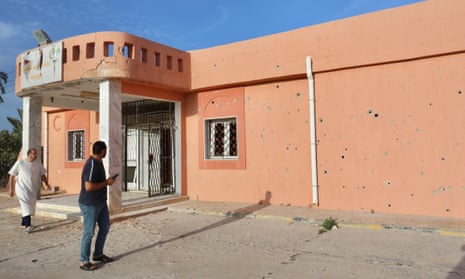Libya’s internationally recognised government has said its forces will keep fighting, after a unilateral ceasefire declaration by its eastern-based opponents in the country’s brutal civil war.
The Government of National Accord (GNA), based in Tripoli, said it did not trust the Libyan National Army (LNA) of renegade general Khalifa Haftar.
Late on Wednesday a spokesman for Haftar said the LNA was adopting a ceasefire for Islam’s holy month of Ramadan in response to requests by the international community and “friendly countries”.
Libya has been split since 2014 between rival administrations in Tripoli and Benghazi. Haftar launched a war to capture Tripoli a year ago, advancing into the southern suburbs before his offensive stalled. His forces, backed by the United Arab Emirates, Egypt and Russia, have continually bombarded the capital.
In recent weeks Haftar’s forces have suffered a series of battlefield reverses during a surge in violence that has included indiscriminate shelling of clearly marked hospitals.
On Monday he abruptly declared a popular mandate to take control of the whole country. The ceasefire offer suggests that he was told by his backers that he had overstepped the mark and needed to bow to international pressure for a lull in fighting if he was to recover lost diplomatic ground. He may also have reasoned that a ceasefire would give him time to reorganise his battered supply lines.
Monday’s political declaration was denounced by the US embassy in Libya and by the Russian foreign minister, Sergei Lavrov, as well as indirectly criticised by France, one of Haftar’s strongest covert backers.
The declaration also implied that Haftar no longer recognised the authority of the elected house of representatives (HoR) in the eastern city of Tobruk, which he had been broadly allied with for many years.
The head of the HoR, Ageela Saleh, had just put forward an eight-point political plan to try to reconcile the east of the country with the GNA.
Haftar has presented himself to his overseas backers as the man to bring security to Libya and crush the Muslim Brotherhood. He has been either tolerated or supported by some countries as the legitimate representative of political forces in the east, but his apparent clash with Saleh, a leading political force in the east, made that claim less tenable.
During the recent escalation in violence and attendant rise in civilian casualties, the LNA shelled a civilian hospital in Tareeq al-Shouq, destroying an intensive care unit. The hospital had been earmarked to take a leading role in the event of a coronavirus outbreak in Libya.
The Dutch embassy in Libya said there had been 12 attacks on medical facilities since the beginning of the year and that the bulk had occurred in GNA-held areas – a diplomatic way of blaming the LNA.
Some of the most intense recent fighting has been around Tarhuna, a town 40 miles south-east of Tripoli used as a platform for the LNA to supply its forces attacking the capital. Electricity has been cut off to Tarhuna for weeks, in retaliation for Hafta’s forces temporarily stopping the gas supply to the Khoms power station (which also supplies Tarhuna). The World Health Organization in Libya had warned the fighting was impeding its work to prepare for a coronavirus outbreak
The GNA, increasingly supported by Turkish drone strikes on LNA supply lines, has also widened its military counteroffensive, including by shelling the LNA’s al-Watyia airbase, the main source of the air threat to civilians in Tripoli. Haftar had previously suffered reverses in a string of coastal towns close to the Tunisian border.
He retains control of the main oilfields and his supporters have closed oil terminals, forcing a two-month shutdown of Libyan production, the country’s economic lifeblood.
Haftar had envisaged his Tripoli offensive as a lightning strike, but he quickly became bogged down south of the city.
On Monday he dismissed the UN-brokered Skhirat political agreement (pdf), laboriously negotiated in 2015, rejecting all the political institutions set up under it and in effect wiping the constitutional slate clean.
The agreement, he said, had “destroyed” the country, and the Libyan people had tasked the LNA general command with a “historic” duty in such extraordinary times.
Some analysts believe Haftar’s rejection of all previous political agreements was in part a reaction to his recent military reverses. Tarek Megerisi, a Libya specialist at the European Council on Foreign Relations thinktank, said: “This move suggests an acknowledgement by Haftar that his attack on Tripoli is unsalvageable, so he is trying to consolidate his case before the ramifications of that failure lead to unmanageable unrest or attempts at an internal coup.”
